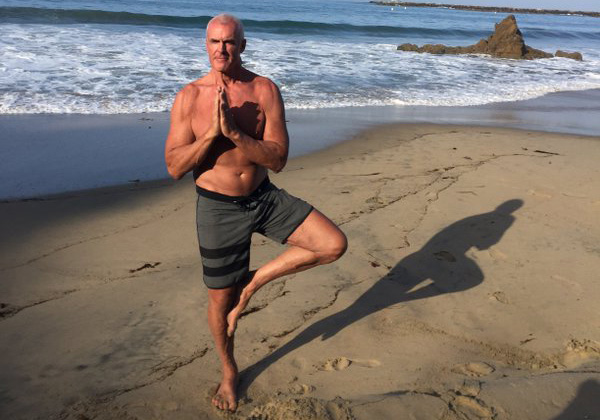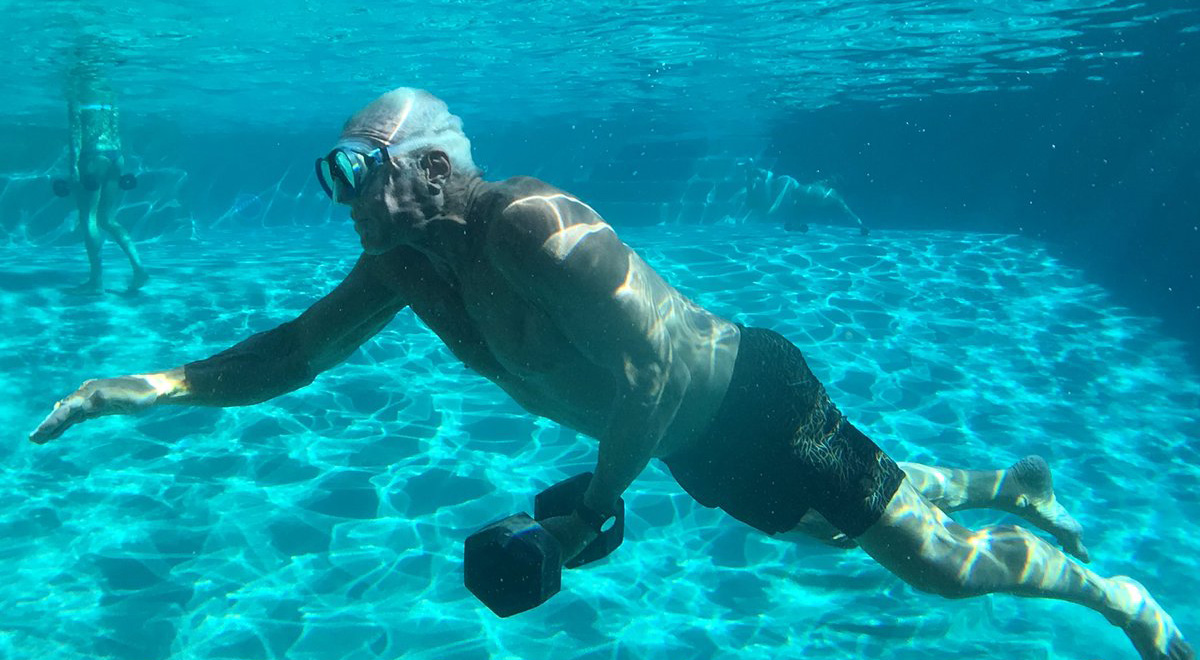Spotlight on NFL Alum and CBS Survivor Castaway: Steve Wright
Former NFL offensive tough guy Steve Wright played for the Colts, Cowboys and the Raiders, retiring from professional football in 1994 after an impressive 12 years in the game. He has been an XPT Experience and Hamilton pool regular since discovering XPT, and has brought his new knowledge of the training into his regular fitness regimen.
We sat down with Steve to talk ice, breathing, Mike Ditka and starving in the jungles of Nicaragua for reality TV. Here’s how it all shook down.
XPT: Steve, how did you first hear about XPT?
SW: My wife Liz and I first heard about XPT online. We respected and followed Laird and Gabby’s activities through Instagram. Laird and Gabby’s experience and passion for what they teach inspires you to dig a little deeper, focus a little more, and to raise your belief in yourself and hold it to a higher standard.
And, we needed a vacation. The XPT Experience delivered!
XPT: What’s your current fitness regimen and how does XPT training enhance that?
SW: I’ve been doing beach workouts since 1987 when I moved out here. I became more aware of my weight—250 lbs–and 280 lbs when I was playing—and that working out on any man made surfaces—pavement or cement—running, stairs, climbing hills just beats your knees and your joints up so much.

I still do hills, there’s a Sand Dune park near me that I like. It’s brutal but it’s so forgiving on your knees and joints and it works your legs and thighs and your hams and everything, but you don’t feel any of it in your joints. It’s the same thing out on the beach, so I’ll do interval runs, walking and speed skater lunges where I jump back and forth like a speed skater down the beach.
My favorite element of XPT is really the pool work. Laird and Gabby emphasize how to focus while relaxing the mind and body, all while holding your breath and working through a sequence of dumbbell movements. It helps to workout in a pool with the weightlessness. You just feel really good, your joints and everything, so it’s just a remarkable difference from having gravity and the weights as you’re jumping up and down, because a lot of the pool work with XPT is jumps. If you did that up in gravity with 20-pound weights in each hand, you’d be able to jump maybe a foot and after maybe 20 of them your knees and back would start hurting. It’s amazing how the water just cushions and eases and works with you.

XPT: People have different experiences with XPT's Performance Breathing® protocols when they first start out. What was your experience early on and how are you finding it now that you’ve been at it for a while?
SW: I try to do at least 30 minutes of breath work 3-4 times a week. I really enjoy the calming benefits I get from it, as well as the stretching and centering myself. It’s an awesome feeling before doing hill work or going to the gym or just attacking the day.
Air is paramount and knowing how to use it… building a relationship with it is key. The breath work and expanding your limits in the pool can be very profound. I always leave the sessions higher and in a better place for the rest of the day.
I also do the breathing at home, I sit on a mat or lay on a mat and do 20-30 minutes. Once you get started it’s easy to keep flowing. It really relaxes you, gets your mind off of everything. I like to put on some meditation music, some monks chanting or something and it just puts you in another place. You really can just feel it relax you internally.
The program is super easy to do, there’s really no right way or wrong way, you can get benefits from exhausting yourself, from exhaling as hard as you can, just clearing out all of your CO2, which the free divers do. My thing that I enjoy doing is just working on being able to hold my breath longer. After three weeks of breathing sessions, I went from being able to hold my breath for 2 minutes to 4 minutes. It’s so important and it’s amazing how I’ve never been exposed to it after 12 years of professional football and high school sports and college. No one ever talked about breathing and it’s just so bizarre because it has so many benefits!
For more on the benefits of XPT's Performance Breathing program, click here!

XPT: Talk to us about recovery when you were in the NFL and post-training recovery now. What goes through your head when you’re in the ice bath?
SW: As a former pro-football player, I’ve experienced more ice than the average Joe, and it’s always mind over matter. Clear the mind and focus. Once you experience the positive benefits from the ice and the daily consistency of the baths, it gets easier.
In the NFL, it was one game a week over 16 weeks. We used to do ice for 15 minutes and I think there was only a few inches of ice at the top of the bath. It wasn’t packed like XPT—they really pack the ice in there, which makes it a little bit colder. We used to sit in there for 15 minutes on Monday (the game was on Sunday) and we’d come in and break our lactic acid down by running and getting a sweat going. Then we’d lift weights and go in and get our wounds and everything tended to. But it was voluntary. You weren’t told to sit in the ice bath, and everyone would fight over it, especially early, because the later you got into it, the dirtier the water would get! Now the teams have big ice baths that a lot of guys can get into all at once. Back in the day, it was just a little tub, and we’d climb in there for at least 15 minutes.
Tuesday was our day off and it was amazing how I’d almost feel like I didn’t even play. It would revive your legs so much. If I didn’t do that, there was so much lactic acid and soreness and tightness and everything else. But when you sit in that ice bath, your body’s working triple overtime to get fresh fluids and blood in there, to flush the lactic acids and bruises and get the circulation going again.
For an article on the benefits of heat and ice contrast therapy, click here!
XPT: What’s it like going through each XPT Experience with a new group? Talk about what makes success stories.
SW: At the XPT Experience, you just feel the immediate sense that “we’re all in this together.” No egos, no belittling, just supporting one another. We’re together roughly 8 a.m. to 8 p.m. for a solid three days of work, education, eating, resting and being together. Relationships are quickly formed. We all just look out for one another and egos are left at the door.
And I love Laird and Gabby. They are so helpful and giving to everyone else. They’ve got that X-factor of good, positive, loving, helping energy.
XPT: You talked a lot about teamwork on Survivor. How did being on CBS’s Survivor change your life? How did it change your body? What did you do after being on the show to get back into shape?
SW: I’ve learned that when people say to me, “Hey, let’s go to dinner, I’m starving.” I think, no, I promise you’re not. I lost 33 pounds in 31 days. It was so unhealthy, not eating, except thousands of termites and little handfuls of rice. But it changed me, allowed me to really appreciate those that have less, who go to bed hungry every night. You learn to deal with it but it’s not a great way to go.
To get my health back, for one, I had to go through a whole parasite protocol. A ton of different herbs over the course of six months. I went to see a naturalist, my system was really screwed up. I got a really bad tooth infection. There was actually a little plant growing underneath my molar. My dentist said he’d never seen anything like it. You know, you don’t brush your teeth for over a month! It was bad.
Then, I got voted out and I was on a jury for about 4-5 days. We were contained at this place, a really nice little boutique hotel with probably 10 rooms on this cliff in Corona del Sur in the southwest corner of Nicaragua. I remember waking up the first morning after getting voted out and they were making eggs and pancakes and hash browns and everything else, and while they were doing that, I had the biggest bowl of ice cream, three different kinds of ice cream with chocolate sauce and M&Ms!
It was raining and I was on this balcony looking down at the water and it was beautiful. I thought I was in heaven. Totally guilt-free. It wasn’t the smartest thing to do, but it was fun.
XPT: Do you think XPT can help current professional athletes?

SW: During time outs and during the games when everyone else is just jumping around, to just sit on the bench for a few minutes and just deep breathe, basically fill up your lungs before you need it. You’re not just filling up your lungs, you’re trying to completely oxygenate your system. There are so many different drills you can do, but for sports, just filling up before the race or the competition.
And it’s not just for athletes—filling up before you go into a board meeting, or a company meeting, or something you need to really focus on. Because when you’re tired, you’re yawning because your body is trying to fill up with more oxygen. So, if you’re tired or if you’re driving home late, you can just take a couple of deep breaths. It just wakes you up. Your brain needs it. Your system needs it.
For sports teams, just load up when they need it. Pat Riley (President, Miami Heat) was up with us at the (Hamilton) pool and said he can’t wait to bring this back to the team. When I was with the Raiders, we’d just be standing out there in the field during a time out, maybe watching fights in the stands or talking. If they were to focus instead on doing some deep breathing, then when the game goes back on there’s nothing better.
Click here for more info on XPT's Performance Breathing program!
XPT: What advice would you give to young athletes who are dreaming of one day going pro?
SW: Ya know, Mike Ditka pulled me aside one time and put his arm around me and saw that I was frustrated. He said that everyone here has the physical tools, everybody’s pretty much on the same page, everybody’s on the same level. There’s not an amazing standout and it really comes down to the shoulders up—your head. You’re gonna get beat. Learn fast. Be the smartest guy.
There’s no reason not to learn all the plays in basketball or football or hockey or soccer, or anything else. Don’t be caught off guard, all the information is there. And then, learn how to deal with adversity, be a team mate. It comes down to everything above your shoulders. Because if you think you’ve got the talent then you may. You may have the physique and the athletic skills, pretty much a good chunk of the rest of the guys you’re playing with do, too. It comes down to being mentally strong. Deal with getting your ass beat. Because it will happen. And you’d see guys that would point fingers and make up excuses or be lazy and just…
Do that little bit extra. Go in there ready to go!
Join us for the next XPT Experience. Make some new friends, take your training to a deeper level and make an investment in yourself. Click here to learn more.
